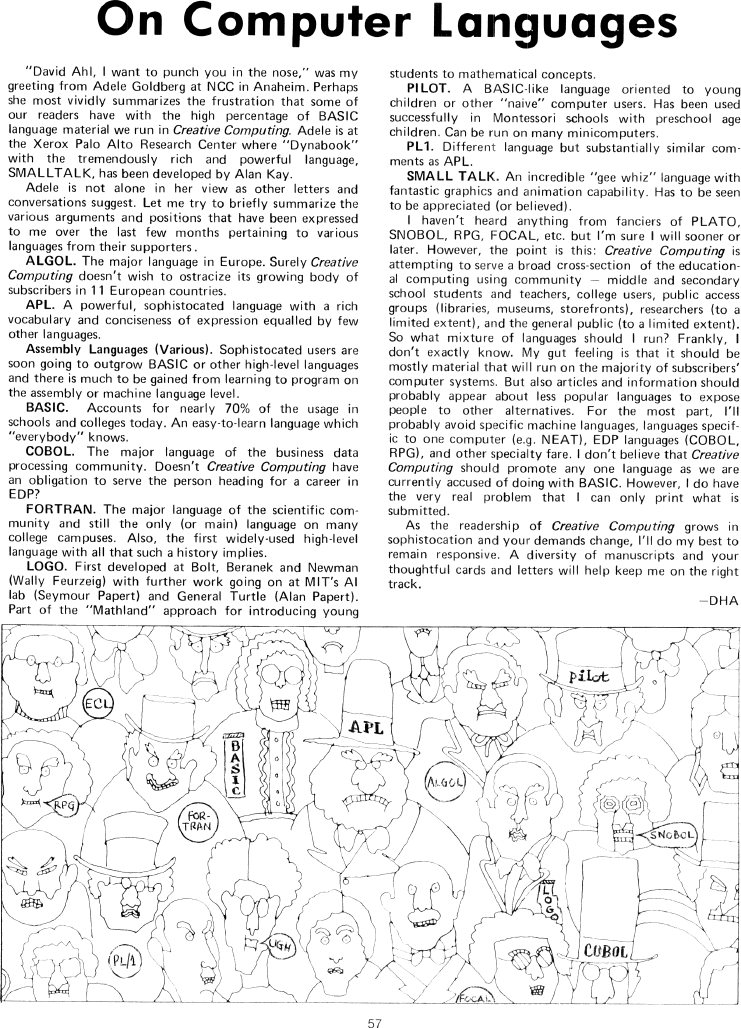The Best of Creative Computing Volume 1 (published 1976)
On Computer Languages (comparison of ALGOL, APL, Assembly Languages, BASIC, COBOL, FORTRAN, LOGO, PILOT, PL1, SMALLTALK and other languages)

On Computer Languages
"David Ahl, I want to punch you in the nose," was my greeting from Adele
Goldberg at NCC in Anaheim. Perhaps
she most vividly summarizes the frustration that some of our readers have with
the high percentage of BASIC
language material we run in Creative Computing. Adele is at the Xerox Palo Alto
Research Center where "Dynabook" with the tremendously rich and powerful
language, SMALLTALK, has been developed by Alan Kay.
Adele is not alone in her view as other letters and conversations suggest. Let
me try to briefly summarize the
various arguments and positions that have been expressed to me over the last few
months pertaining to various
languages from their supporters.
ALGOL. The major language in Europe. Surely Creative Computing doesn't wish to
ostracize its growing body of
subscribers in 11 European countries.
APL. A powerful, sophisticated language with a rich vocabulary and conciseness
of expression equalled by few
other languages.
Assembly Languages (Various). Sophisticated users are soon going to outgrow
BASIC or other high-level languages and there is much to be gained from learning
to program on the assembly or machine language level.
BASIC. Accounts for nearly 70% of the usage in schools and colleges today. An
easy-to-learn language which
"everybody" knows.
COBOL. The major language of the business data processing community. Doesn't
Creative Computing have
an obligation to serve the person heading for a career in EDP?
FORTRAN. The major language of the scientific community and still the only (or
main) language on many
college campuses. Also, the first widely-used high-level language with all that
such a history implies.
LOGO. First developed at Bolt, Beranek and Newman (Wally Feurzeig) with further
work going on at MIT's Al lab (Seymour Papert) and General Turtle (Alan Papert).
Part of the "Mathland" approach for introducing young students to mathematical
concepts.
PILOT. A BASIC-like language oriented to young children or other "naive"
computer users. Has been used
successfully in Montessori schools with preschool age children. Can be run on
many minicomputers.
PL1. Different language but substantially similar comments as APL.
SMALL TALK. An incredible "gee whiz" language with fantastic graphics and
animation capability. Has to be seen
to be appreciated (or believed).
I haven't heard anything from fanciers of PLATO, SNOBOL, RPG, FOCAL, etc. but
I'm sure I will sooner or
later. However, the point is this: Creative Computing is attempting to serve a
broad cross-section of the educational computing using community - middle and
secondary school students and teachers, college users, public access groups
(libraries, museums, storefronts), researchers (to a limited extent), and the
general public (to a limited extent). So what mixture of languages should I run?
Frankly, I don't exactly know. My gut feeling is that it should be mostly
material that will run on the majority of subscribers' computer systems. But
also articles and information should probably appear about less popular
languages to expose
people to other alternatives. For the most part, I'll probably avoid specific
machine languages, languages specific to one computer (e.g. NEAT), EDP languages
(COBOL, RPG), and other specialty fare. I don't believe that Creative Computing
should promote any one language as we are currently accused of doing with BASIC.
However, I do have the very real problem that I can only print what is
submitted.
As the readership of Creative Computing grows in sophistication and your demands
change, I'll do my best to
remain responsive. A diversity of manuscripts and your thoughtful cards and
letters will help keep me on the right track.
-DHA
[image]


